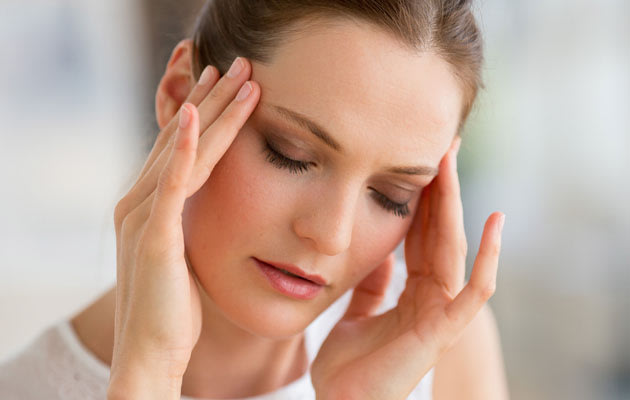Caffeine has hit the headlines again as it's been found to seriously affect men's fertility. New research has found that drinking just two strong cups of Joe a day could halve their chances of conceiving a child.
We know that too much caffeine isn't super duper healthy for us, but can our beloved coffee and tea really be that harmful to our health? And are we unwittingly drinking far more than is healthy without even realising?
In the past women have been warned not to overdo caffeine in pregnancy and there are studies suggesting it can raise the risk of miscarriage - so most women trying to conceive cut down anyway.
But this seems to be the first time men have been warned that their caffeine consumption could affect parenthood.
The research at Massachusetts General Hospital in Boston showed that men who drank 265gm of caffeine a day had the least chance of becoming fathers. Experts suggest this could be because caffeine may harm sperm at a molecular level.
And though men who aren't trying to conceive might not think that they have anything to worry about, it definitely raises questions about what else caffeine might be doing to our health that we have no idea about.
Last year the editor in chief of the Journal of Caffeine Research Dr Jack James suggested caffeine-containing products need health warnings similar to those found on cigarette packets.
Dr James, who is head of the department of psychology at Reykjavik University, Iceland, has claimed that we're all consuming way more caffeine than we think we are.
According to him, manufacturers include it in all kinds of products you wouldn't expect from chewing gum to painkillers.
But it's confusing because research and recommendations about caffeine seem very conflicted and ever changing. While some experts suggest we eschew is stuff is entirely, other studies have found that in small amounts, say two cups of coffee a day, it can be beneficial.
Some countries in Europe and Scandinavia are already taking action to regulate how much caffeine is used and in what products, but in the UK we still presume it to be more or less harmless.
Should we give up caffeine altogether?
Should we be ditching our coffee habits ASAP and do we need to be checking all the foods, drinks, medicines and even cosmetics we use to make sure we're not over-doing it?
It's suggested adults only consume 400mg of caffeine a day (two cups of instant coffee or four of tea). To put this into perspective, one large Starbucks coffee contains 360mg. So savour your morning cup as you shouldn't be drinking any more that day.
Some countries in Europe and Scandinavia are already taking action to regulate how much caffeine is used and in what products, but in the UK we still presume it to be more or less harmless.
Should we give up caffeine altogether?
Should we be ditching our coffee habits ASAP and do we need to be checking all the foods, drinks, medicines and even cosmetics we use to make sure we're not over-doing it?
It's suggested adults only consume 400mg of caffeine a day (two cups of instant coffee or four of tea). To put this into perspective, one large Starbucks coffee contains 360mg. So savour your morning cup as you shouldn't be drinking any more that day.
Though some studies have linked moderate caffeine consumption to better kidney function and a reduction in gallstones, and even heart benefits, experts remain cautious.
Migraine expert Dr Nicholas Silver, consultant neurologist at The Walton Centre for Neurology and Neurosurgery, told Yahoo! Lifestyle that he believed we could get rid of 80 per cent of chronic illnesses, sleep problems, migraines and headaches if we simply stopped consuming caffeine.
Women should also bear in mind that caffeine stops your body being able to absorb iron, which could end up leaving you deficient (anaemic) and making you feel more tired - and reaching for another cuppa.
But ultimately there is no right or wrong answer. Individuals respond differently to all drugs and caffeine is no differently. Signs of overdoing it include a racing heartbeat and palpitations, anxiety, an upset stomach, dizziness and insomnia.
Migraine expert Dr Nicholas Silver, consultant neurologist at The Walton Centre for Neurology and Neurosurgery, told Yahoo! Lifestyle that he believed we could get rid of 80 per cent of chronic illnesses, sleep problems, migraines and headaches if we simply stopped consuming caffeine.
Women should also bear in mind that caffeine stops your body being able to absorb iron, which could end up leaving you deficient (anaemic) and making you feel more tired - and reaching for another cuppa.
But ultimately there is no right or wrong answer. Individuals respond differently to all drugs and caffeine is no differently. Signs of overdoing it include a racing heartbeat and palpitations, anxiety, an upset stomach, dizziness and insomnia.
If you are suffering from these, are feeling antsy, having troubles sleeping or regularly get headaches or migraines, you may want to try giving up caffeine to see if it helps.
However if you're a moderate coffee drinker and see no ill effects, there's no need to immediately ditch your favourite beverage - unless of course, you're a man having trouble conceiving, in which case get on the decaff stat.
Try swapping one of your daily coffees for a green or other herbal tea and see if you feel better for it. It still contains caffeine but at lower levels and with the added boost of healthy antioxidants.




No comments:
Post a Comment